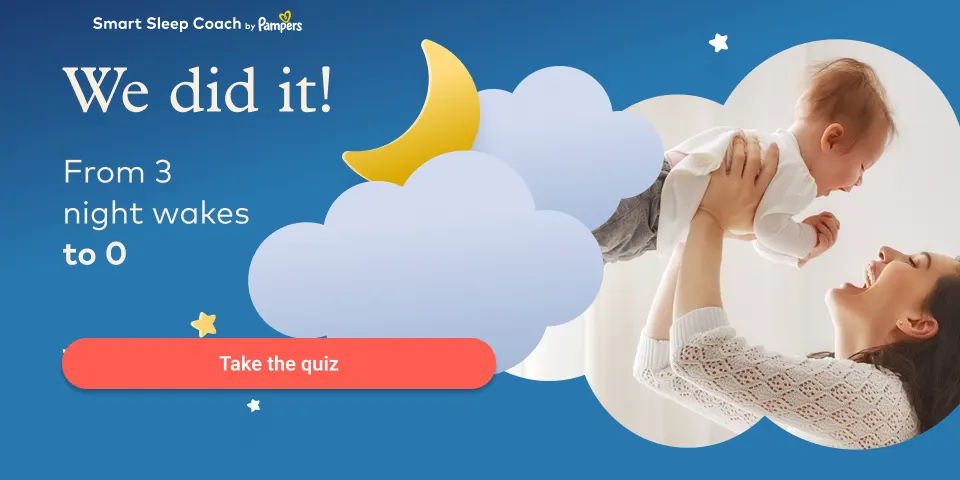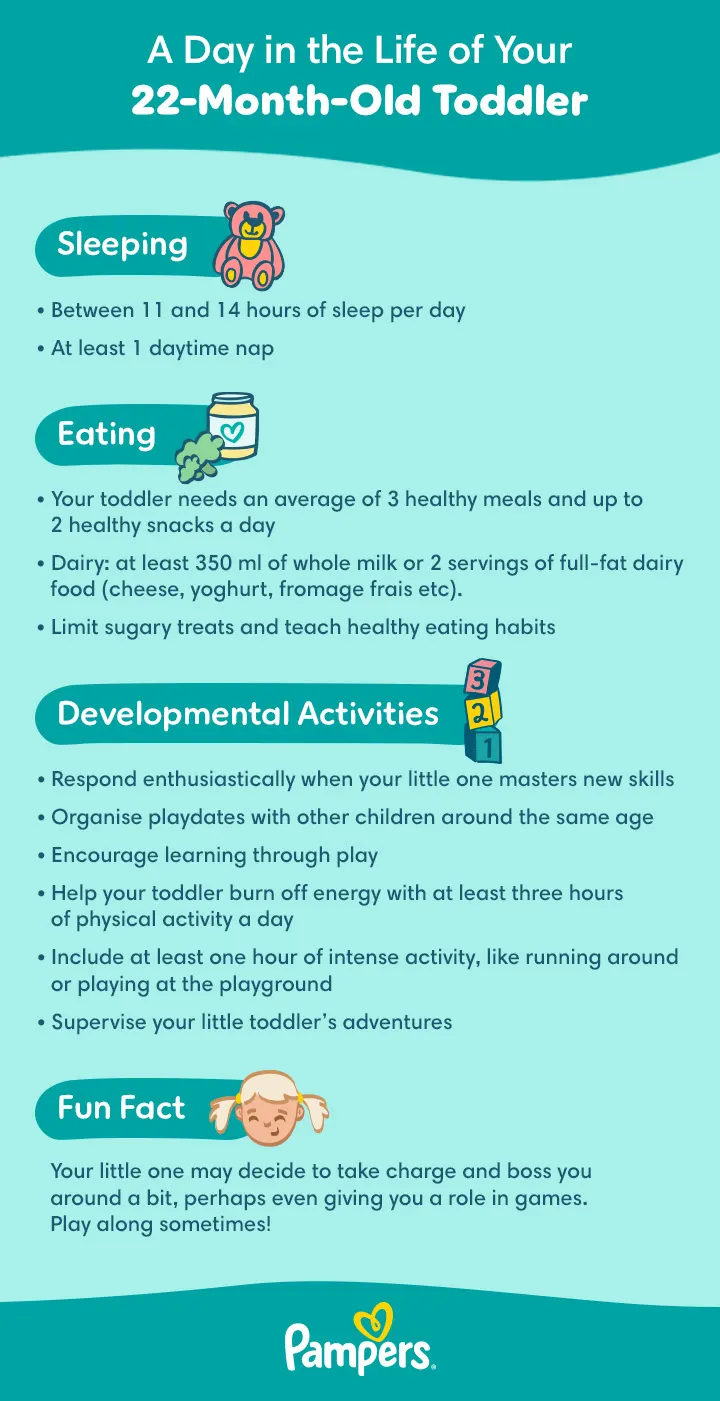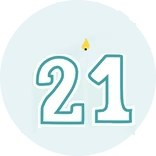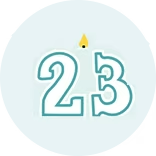22-Month-Old: Meet the New Boss
At 22 months old, your toddler might be showing some attitude. Don’t be surprised if your little one gets a little bossy sometimes – this is a common feature of toddlerhood. Learn more about this and other areas of your 22-month old’s development, such as speech, movement and much more.
Toddler Development Milestones
Each day, week and month brings something new with a growing toddler in the house. No two children learn and develop at the same pace, but here are some things your toddler might be getting up to around the age of 22 months old:
Movement: Standing on Tiptoes
Your toddler may soon be able to stand on tiptoes or might have mastered this skill already. Be extra careful to keep any potential hazards – such as cords, plastic bags, glassware, hot or sharp items – packed away, as your child may be using those extra few inches to reach for objects on a table or shelf.
Other skills your 22-month-old may be mastering around this time include:
Throwing or kicking a ball
Carrying objects while walking
Eating with a fork or spoon
Going up stairs with support
Building a tower from three or four block
Pouring liquids out of a cup or other container.
Comprehension: Following Simple Instructions
Now or in the coming months, your toddler may be able to understand and follow simple instructions such as to pick up a toy or sit down. Now’s a good time to get into the habit of telling your child as well as pointing or showing what to do.
Speech at 22 months old: Repeating Words Back
Your toddler understands more than he or she can say and may be paying more attention than you realise. Your child could also start repeating words overheard from your conversations, so you might need to be more conscious of what you say when your little one is within earshot.
Social Development: Getting Assertive
Don’t be surprised if your toddler gets a little bossy or defiant, telling you what role you have in a shared game or activity or instructing you on what to do and when. Tantrums could also be getting more frequent at around 22 months old.
The good news is that these tantrums are just part of a phase. In the meantime, try to be patient, set clear boundaries and praise good behaviour. Although this stage of toddlerhood is sometimes known as the ‘terrible twos’, it isn’t just about the tantrums and challenging behaviour – the next couple of years are also a time of magical discovery.
How to Support Your Baby’s Development
There are plenty of ways you can support your 22-month-old’s development. Here are a few tips and activities you might like to try:
Be your little one’s biggest fan. Encourage your toddler by responding enthusiastically to new achievements and praising good behaviour. Responding positively to good behaviour (and sometimes turning a blind eye to minor naughtiness) could also help to reduce challenging behaviour.
Supervise your explorer. Your 22-month-old is becoming more mobile and independent almost by the day, but doesn’t yet have the ability to think things through and understand what might be dangerous. Make sure you’re on hand to supervise your toddler’s exploration.
Encourage skills development through play. Play is the best way to help your toddler learn, so help your child be creative during playtime. Activities like threading pasta onto a string or stacking blocks can boost your 22-month-old’s fine motor skills Kicking and throwing balls or walking while carrying things can improve balance and coordination. Visits to the playground aren’t only fun, they’re also beneficial for development.
Arrange playdates. Give your child opportunities to be with other children – even if they don’t play together ‘properly’ for now. This is a great way of getting your child used to being around other kids and helping your 22-month-old develop the social skills needed to eventually (at around 3 to 4 years old) fully interact and join in with group games and activities. But that’s still a little way off. There are several stages of play that your child will pass through first. At 22 months old, your toddler may still be playing alone, without paying attention to others. Soon, however, you might notice your toddler starting to watch other children play, although he or she probably won’t join in just yet. Sometime after two years old, your toddler will transition from just watching other children play to the next stage of play, known as parallel play – this is when your child starts playing alongside one or more other children, sometimes watching and/or sometimes imitating them.
Mealtimes for Your 22-Month-Old Toddler
Your toddler needs a good variety of nutritious foods for healthy growth and development. Most 22-month-olds will do well with 3 healthy meals and up to 2 snacks per day.
Dairy: Your 22-Month-Old’s Milk Intake
You might be wondering how much milk and dairy your toddler needs, or what to give your little one instead if he or she has a dairy-free diet.
Whole milk and full-fat dairy products are an important source of energy, calcium and vitamin A. At 22 months old, your little one needs at least:
350 millilitres of whole milk, or
2 servings of full fat dairy foods like yoghurt, cheese or fromage frais, or
Calcium-fortified dairy alternative like oat, almond or soya (but not rice) drinks.
Start Healthy Habits Early
Keeping to a healthy weight from an early age lowers the risk of health problems when your child is older. Your health visitor will be tracking your toddler’s weight gain on growth charts at regular health and development reviews, when you’ll have the chance to talk about any concerns.
Still, it’s never too early to get into healthy lifestyle habits: small changes in childhood could help your little one stay at a healthy weight and prevent problems later on.
Here are a few things you can do now to encourage healthy habits:
Lead by example. Your toddler learns best by example, so being active and eating healthily yourself will benefit both of you! Be a great role model by getting plenty of exercise and choosing healthy food options. Get the whole family involved in activities like visiting the park, playground or swimming pool.
Encourage physical activity. At 22 months old your toddler needs at least 180 minutes (3 hours) a day of physical activity. This can be spread throughout the day, and includes lighter activities like standing up, walking around and playing. However, it’s important that your toddler spends some of the day doing more intensive activities like running, using a climbing frame or riding a tricycle or bike.
Offer healthy choices. Offer a variety of healthy foods at appropriate times and try to include at least five portions of fruit and vegetables a day. In your toddler’s diet – along with the other important food groups: starchy foods, protein and dairy (or alternatives). This might sound like a lot of food preparation, but frozen and tinned fruit and veg also counts (as long as there’s no added sugar or salt). One small glass of unsweetened fruit juice can also be included. Keep in mind that fruit juice is best given with a main meal (not as a between-meals snack), to lower the risk of tooth decay.
Encourage healthy eating habits. Do your best to stick to regular mealtimes and avoid giving oversized portions of food. A good policy is to start each meal with a small serving and encourage your toddler to ask for more if he or she is still hungry. Don’t try making your child finish everything on the plate or eat more than he or she wants. Using child-sized plates makes it easier to dish out kid-sized servings.
Choose nutritious snacks. One or two snacks a day can be great for tiding your toddler over between mealtimes, but snacks shouldn’t be a substitute for main meals. Always offer healthy snacks like fruit slices or unsweetened yoghurt, rather than crisps or sweets and sugary drinks.
Eat at the table. Put away phones, turn off the TV and enjoy a family meal together at the table. Relaxed family mealtimes with conversation fosters bonding and helps your toddler’s social development.
Ask your health visitor for more information about your toddler’s nutrition and how to encourage physical activity and healthy eating.
How Much Sleep Does a 22-Month-Old Baby Need?
Your toddler needs around 11 to 14 hours of sleep per day and could be down to 1 nap per day at 22 months old, although every child is different.
Bedtime Won’t Always Go to Plan
Your toddler’s sleep is important but there’s no need to worry if things don’t always go smoothly. Make an effort to put your little one to bed at the same time each night, but don’t worry if this happens later than planned on occasion.
Life is exciting for your toddler, and things like having a guest over, learning something new or getting a new toy may make your child want to stay up past the usual bedtime. Keeping excitement to a minimum in the hours before bed and a soothing bath or bedtime story can help your 22-month-old wind down.
If your child does stay up longer than usual, just try to get back on track the next night and help return to the usual bedtime routine. The odd late night here and there won’t make a difference in the long run.
Keep in mind that sometimes you might experience periods of sleep regression, when your toddler who was sleeping well starts to have difficulties falling or staying asleep. Try some of these sleep training methods and tips if your 22-month-old is experiencing sleep problems that don’t seem to clear up by themselves – or ask your health visitor for personalised advice.
A Day in the Life of Your Toddler
You could say there’s no such thing as a ‘typical’ day with a 22-month-old toddler, but here’s how things could shape up over an average 24-hour period in your home:
Your Toddler’s Health: Food Safety
Your toddler’s immune system is still developing at 22 months old, so your child is at a higher risk of food poisoning caused by certain kinds of bacteria. The good news is, there’s plenty you can do to keep your little one safe when preparing and serving food.
Here are some ways to help prevent some of the main causes of tummy troubles and other illnesses caused by germs in food:
Wash hands. Wash your own hands before preparing food, and immediately afterwards if you’ve been handling raw meat, chicken, fish and shellfish, eggs and raw vegetables. Make sure your child’s hands are clean before eating, and start teaching him or her to wash hands before every meal, as well as after using the toilet/potty, touching pets or playing outside.
Keep surfaces and dinnerware clean. Keep your kitchen counter, table and other surfaces clean. Wash bowls, cups, plates and cutlery in hot soapy water (or use a dishwasher).
Keep raw ingredients separate. Raw meat and eggs should be kept in covered or sealed containers in a separate place at the bottom of the fridge (to prevent drips falling onto other food or ingredients).
Cook all food thoroughly. Then cool it to lukewarm before feeding it to your toddler.
Don’t reuse half-eaten food. If your child leaves food on the plate, don’t save and give it to your toddler again later.
Wash and peel fruit and veg. It’s safer to clean and remove the skins of fruit like apples or pears or vegetables like carrots, before serving them up to your little one.
Avoid raw eggs without the ‘Red Lion’ mark. Only give your toddler food with raw egg in it – for example home-made mayonnaise or uncooked cake mixture – if they’re stamped with the Red Lion mark. Eggs with this stamp have a low risk of contamination with salmonella germs. All other eggs should be cooked thoroughly until the white and the yolk are firm. The same goes for all non-chicken eggs, such as duck or quail.
Only serve fully cooked shellfish. Raw or lightly cooked shellfish aren’t suitable for toddlers.
FAQs at a Glance
At around 22 months old, your toddler may start putting words together to make simple sentences, like ‘mummy drink’ or ‘all gone’. Precisely when this happens can vary a lot though – try not to worry if your 22-month-old is not talking as much as you expected. Talk to your health visitor if you’re concerned.
Your Life as a Parent: Dealing With Challenging Behaviour
Toddlers are known for having tantrums, and this kind of behaviour may start appearing at around 22 months old if it hasn’t already. This is a normal stage of development as your little one becomes more independent, so don’t worry: It won’t last forever – the tantrums are usually far less frequent by the age of around 4 years old – and there will still be plenty of magical moments as your toddler continues to explore the world.
Here are a few ideas for you to help keep the upcoming ‘terrible twos’ at bay and curb any aggressive tendencies:
Understand that toddlers can’t control themselves. At 22 months old your child doesn't have much self-control, and still needs to learn – with your help – not to push, hit, bite or kick when angry or upset. Try helping your toddler to use words to express his or her feelings – often, the outburst is caused by frustration at not being to do this yet.
Identify the cause of the upset. Sometimes your toddler may just be hungry, thirsty or in need of a cuddle. Talk to your upset child and see if a snack, a rest or just a big hug might be all it takes to set the world to rights.
Set clear boundaries. Create some simple house rules and start teaching them to your toddler. When rules are broken, be firm and clear about what your child did wrong. Keep in mind that teaching rules and having them obeyed is something that takes time. This is natural as this part of your toddler’s development is all about testing the limits of what’s possible or permitted.
Avoid threats. It’s more effective to ‘catch’ your little one being good and reinforce good behaviour with praise. If you notice bad behaviour, try to teach an alternative way to behave instead of issuing threats.
Use distractions. Preventing poor choices or bad behaviour at this age often comes down to presenting better alternatives instead. For example, if you see your toddler reaching for something breakable like a ceramic salt cellar or a china teacup, offer an alternative like a spoon to bang instead.
Keep a cool head. It’s easy to lose your cool and run out of patience, but it’s important not to retaliate. Firstly, smacking is known to be harmful in the long run. Secondly, you’re a role model for your little one: If you can express your anger or frustration in a cool, calm way – without shouting or swearing – your toddler will learn to do the same.
Checklist for This Month
Do another round of childproofing. Your toddler is getting more mobile and curious, not to mention bigger, so have a look over your home’s childproofing to check that nothing dangerous is within her reach.
Get gardening with your child. If you have a garden or some outdoor space for pots, you might like to show your 22-month-old how plants are potted and what the roots look like. Get some safe-to-use kid’s gardening tools, like a mini trowel and rake, and see if your little one has green fingers. Encourage your child to help water the plants or pick a bouquet. If you don’t have a garden of your own, you could still plant some window boxes or see if there’s a community garden nearby. Always supervise your little gardener closely, especially if there’s a water feature like a pond in your garden. Wash your toddler’s hands after handling plants and soil.
Take your toddler swimming. Get your 22-month-old used to the water and have plenty of splashy fun by signing up for parent and toddler play classes. Many of these classes are designed for you and your little one to get in the water together.
Start planning your toddler’s second birthday. With only a few more weeks to go, you might want to start thinking about how to celebrate when your toddler turns 2 years old. At 22 months old your little one may already have favourite colours or storybook characters that can be woven into a party theme or birthday cake design. There may be little friends from playgroup or nursery school who can be invited, and older siblings can get involved in the preparations – for example, designing invitations or decorations.
Get more tips and information by signing up for our regular emails.
22 month old baby - checklist





